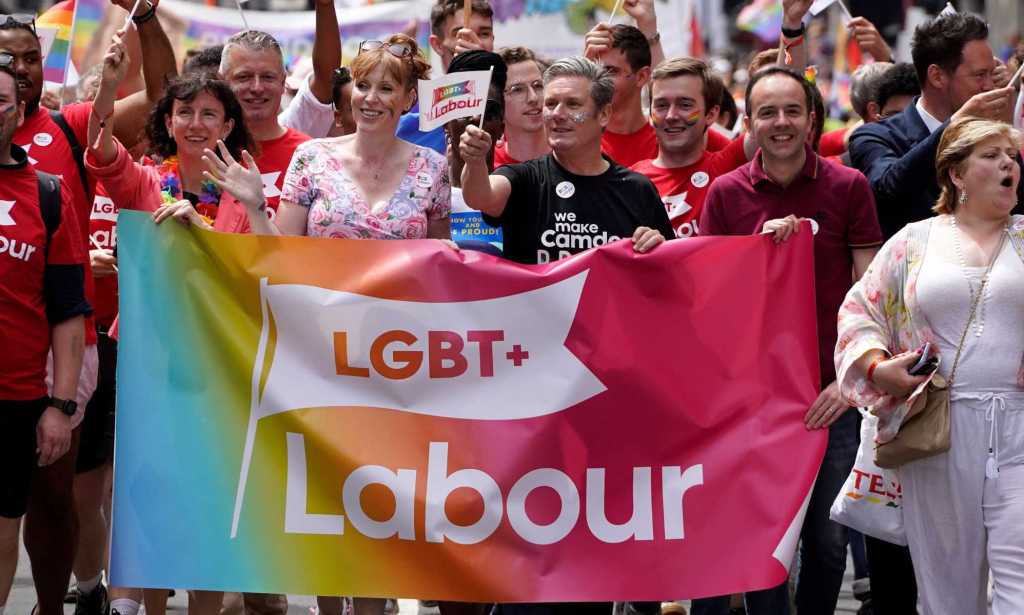Keir Starmer says LGBTQ-inclusive workplaces are ‘core’ to Labour’s economic policy

Keir Starmer is aiming to put LGBTQ+ inclusion at the heart of Labour’s economic policies (Ewan Bootman/Anadolu Agency via Getty Images)
Labour leader Keir Starmer has said LGBTQ+ inclusion in workplaces are at the heart of the party’s economic policies.
On Thursday (29 June), Starmer and shadow women’s and equalities secretary Anneliese Dodds met with LGBTQ+ business leaders to pay tribute to these “pioneers” and to mark Pride month.
Pledging Labour’s commitment to the idea, Starmer highlighted how more inclusive workplaces and business practices will be a “core tenet” of Labour’s economic recovery plan.
“Britain’s economy is built on the efforts of working people and brilliant business people. They will build the growth we need,” he said.
“The best teams value everyone for who they are, and in return they get the very best out of them. Those at the forefront of building these inclusive businesses know this is how you unlock growth and hold expertise.
“I saw that when I led a public service and now as I lead the Labour Party.
“Labour growth will be inclusive in every way, we will ensure working people are able to work free of harassment and able to be entirely themselves,” he added.
Labour’s pledge includes requiring employers to create and maintain workplaces and working conditions free from harassment, with the party exploring measures such as the liability employers bear for any harassment in their workplaces and a duty to take action on it.
Research by the Trades Union Congress (TUC) in 2019 revealed that, on average, seven in every 10 LGBTQ+ people faced sexual harassment at work.
More recent research by the TUC showed 21 per cent of workplaces do not have any policies to specifically support LGBTQ+ staff. This is worse for the trans community, with just one in four managers saying they have a policy setting out support for trans and non-binary workers who wish to transition.
Dodds said that inclusion matters to LGBTQ+ people, adding: “We need to harness the potential of everyone in our economy and that means making sure people at work feel safe and supported.
“Retaining and attracting talented staff is a huge challenge for firms which is why inclusive practices are good for working people, good for business and good for our economy as a whole.
“Labour will make inclusion the norm, not the outlier, by requiring employers to tackle discrimination and harassment.”
Another business leader at the meeting was Iain Anderson, the executive chairman of public affairs agency Cicero, who said: “We need to see everyone thrive at work. There are real opportunities for large and small businesses to work together to make this happen. I know there is so much potential that can still be unleashed.”
Dominic Arnall, the chief executive officer of Open for Business, said it was fantastic to see Labour championing inclusive workplaces.
“We represent a coalition of 36 global organisations, all of whom share a deep-rooted commitment to diversity and inclusion,” he continued. “Our research shows that LGBTQ+ inclusion is key to competitiveness and found a direct relationship between a company’s support for LGBTQ+ inclusion and its ability to connect with global markets and supply chains more effectively.
“We’re pleased the Labour Party has recognised the importance of inclusion, both to business and the wider economy.”
Trust in Labour on LGBTQ+ rights faltering
In recent months, Labour and Starmer, in particular, have faced criticism for their stance on LGBTQ+ rights issues, with members of the community accusing the party of siding with the Tories on key issues and backtracking on promises.
In January, when the government blocked Scotland’s landmark gender reform law, only a handful of Labour MPs voted against invoking a Section 35 order that prevented the bill gaining royal assent.
A number of those MPs said they voted on principle, noting that even if a majority of Labour MPs had voted against the motion, it would not have made a difference.
Neither Starmer nor Dodds voted against Section 35. Instead, the Labour leader remained coy about whether he supported the Tories blocking the Scottish bill.
While he says he wants to “modernise” the Gender Recognition Act (GRA), with ongoing concerns about what this would actually entail, he expressed “concerns” about the Scottish law and said people aged 16 are too young to transition.
In a statement following this, Dodds promised to “modernise” the act. “Trans rights and women’s rights must not be used as political footballs,” she said.
“Labour supports modernisation of the gender-recognition process, but we would not have gone about it this way. For example, UK Labour does not support reducing the age at which you can get a GRC [gender recognition certificate] to 16.”

In the months that followed, trans rights became an increasingly hot topic within Labour, with calls from members and the wider community for the party to adopt an official definition of transphobia.
By April, the culture war surrounding trans rights was at fever pitch with both prime minister Rishi Sunak and Starmer weighing in on the controversy-stoking question: “what is a woman?”
Starmer was accused of “throwing trans people under the bus” by suggesting he supports outing trans pupils in schools, and engaging in invasive questioning about trans women’s genitals.
Just two weeks later, at Easter, he raised more concern by visiting a church with reported links to an anti-gay megachurch and evangelical Christian groups that call homosexuality and same-sex relationships a sin.

